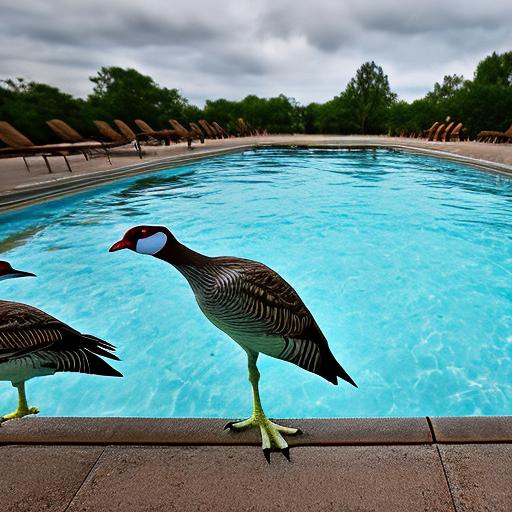Geese are a common sight near water bodies, including pools. These graceful birds are attracted to water for drinking, bathing, and feeding. However, their presence can cause a number of problems for pool owners. Geese may also see pools as a safe place to rest and nest, leading to further complications. In this article, we will explore the behavior of geese near water bodies, the dangers they pose in pools, and various methods to keep them out.
Key Takeaways
- Geese can be a problem in pools due to their behavior near water bodies.
- Geese in pools can pose a danger and should be kept out.
- Common methods to keep geese out of pools include noise deterrents and visual scare tactics.
- Physical barriers like fences and netting can also prevent geese from entering pools.
- Maintaining pool cleanliness and educating the community can help prevent geese from using pools.
Understanding the behavior of geese near water bodies
Geese are social animals that often travel in flocks. They are attracted to water bodies because they provide a source of hydration and food. Geese feed on aquatic plants, grass, and grains found near water bodies. They also use water for bathing and preening their feathers.
When it comes to pools, geese may mistake them for natural bodies of water. The reflective surface of the pool can resemble a pond or lake, making it an appealing spot for geese to visit. Additionally, pools often have surrounding grassy areas that provide a source of food for geese.
The dangers of geese in pools and why they should be kept out
While geese may seem harmless, their presence in pools can pose several dangers. Firstly, geese can carry diseases that can be transmitted to humans. These diseases include avian influenza and salmonella. Contact with contaminated water or surfaces can lead to illness in humans.
Furthermore, geese droppings can contaminate the pool water and surrounding areas. Their droppings contain bacteria that can cause infections and other health issues. The accumulation of droppings can also create an unsightly mess and unpleasant odor.
In addition to health concerns, geese can cause damage to pool equipment and landscaping. Their sharp beaks and claws can scratch or puncture pool covers, liners, and other components. Geese may also trample on plants and grass, leading to damage to the landscaping around the pool.
Common methods used to keep geese out of pools
There are several methods that pool owners can employ to keep geese out of their pools. One common approach is scare tactics. This involves using loud noises or motion-activated sprinklers to startle the geese and discourage them from approaching the pool area. The sudden movement or noise can make the geese feel threatened and prompt them to leave.
Another method is removing food sources that attract geese. This can include regularly cleaning up grass clippings, fallen fruit, or any other food items that may be present near the pool. By eliminating these food sources, pool owners can make the area less appealing to geese.
Fencing off pool areas is another effective way to keep geese out. Installing a fence around the pool can create a physical barrier that prevents geese from entering. The fence should be at least three feet high and have small gaps to prevent geese from squeezing through.
Installing physical barriers to prevent geese from entering pools
In addition to fencing, there are other physical barriers that can be installed to prevent geese from entering pools. Netting or covers can be placed over the pool to keep geese out. These barriers should be securely fastened and cover the entire surface of the pool to be effective.
Another option is using hedging or planting dense vegetation around the pool area. This creates a natural barrier that makes it difficult for geese to access the pool. Hedging should be at least three feet tall and dense enough to prevent geese from squeezing through.
Using decoys and repellents to deter geese from approaching pools

Decoys can be an effective method for deterring geese from approaching pools. Fake predators or other animals, such as coyotes or alligators, can be placed near the pool to scare geese away. The presence of these decoys can make geese feel threatened and prompt them to find another location.
Repellents can also be used to make the pool area less attractive to geese. Sprays or gels that contain ingredients that geese find unpleasant can be applied to the pool area. These repellents create an unpleasant scent or taste that deters geese from approaching.
Natural methods to discourage geese from entering pool areas
There are natural methods that can be used to discourage geese from entering pool areas. Planting certain types of vegetation that geese dislike can be effective. Geese tend to avoid plants with strong scents or prickly leaves. Examples of such plants include lavender, rosemary, and holly.
Using natural predators can also help deter geese from approaching pools. Dogs or hawks can be trained to scare geese away. The presence of these predators can make geese feel threatened and prompt them to find a safer location.
Maintaining pool cleanliness to discourage geese from using it
Regularly cleaning the pool and surrounding areas is essential for discouraging geese from using it. Geese are attracted to pools with stagnant water or debris floating on the surface. By keeping the pool clean and removing any debris or standing water, pool owners can make the area less appealing to geese.
It is also important to regularly clean up any droppings left by geese. This not only helps maintain the cleanliness of the pool but also removes any scent markers that may attract other geese.
Educating neighbors and community members on the importance of keeping geese out of pools
Preventing geese from entering pools is not just the responsibility of individual pool owners. It is important to educate neighbors and community members on the importance of keeping geese out of pools. By spreading awareness about the dangers geese pose and the methods to prevent their entry, a collective effort can be made to create a geese-free environment.
Encouraging others to take similar preventative measures can help create a more effective barrier against geese. Working together to implement these methods can significantly reduce the chances of geese entering pools and causing problems.
Conclusion and final tips for successful geese prevention in pool areas
In conclusion, geese can cause a number of problems for pool owners. Their presence can lead to health risks, damage to pool equipment and landscaping, and an unsightly mess. However, there are various methods that can be employed to keep geese out of pools.
Combining multiple methods is often the most effective approach. Scare tactics, removing food sources, installing physical barriers, using decoys and repellents, employing natural methods, and maintaining pool cleanliness all play a role in successful geese prevention.
It is important to be consistent and persistent in geese prevention efforts. Geese are persistent creatures and may attempt to return to the pool area even after being deterred. By consistently implementing preventative measures, pool owners can enjoy a clean and safe pool area free from geese and their mess.
If you’re looking for more tips on how to keep geese out of your pool, you might also be interested in learning about the importance of a well-designed floor for your chicken coop. Poultry Wizard has a helpful article on the topic, which you can find here. A properly constructed coop floor not only provides comfort and safety for your chickens but also helps in keeping unwanted visitors, like geese, out of their living space. So, check out this article to ensure that your chicken coop is secure and well-maintained.
FAQs
What are some common problems caused by geese in pools?
Geese can cause a variety of problems in pools, including leaving droppings, damaging pool covers, and potentially spreading diseases.
What are some effective ways to keep geese out of a pool?
Some effective ways to keep geese out of a pool include using decoys, installing fencing or netting, using motion-activated sprinklers, and using repellents such as reflective tape or predator urine.
Are there any humane ways to keep geese out of a pool?
Yes, there are several humane ways to keep geese out of a pool, such as using decoys or repellents that do not harm the geese.
Can geese cause damage to pool equipment?
Yes, geese can potentially cause damage to pool equipment such as covers and filters.
What should I do if I find geese in my pool?
If you find geese in your pool, it is important to remove them as soon as possible to prevent any damage or health hazards. You can contact a wildlife removal service or use humane methods to encourage the geese to leave.
Meet Walter, the feathered-friend fanatic of Florida! Nestled in the sunshine state, Walter struts through life with his feathered companions, clucking his way to happiness. With a coop that’s fancier than a five-star hotel, he’s the Don Juan of the chicken world. When he’s not teaching his hens to do the cha-cha, you’ll find him in a heated debate with his prized rooster, Sir Clucks-a-Lot. Walter’s poultry passion is no yolk; he’s the sunny-side-up guy you never knew you needed in your flock of friends!







